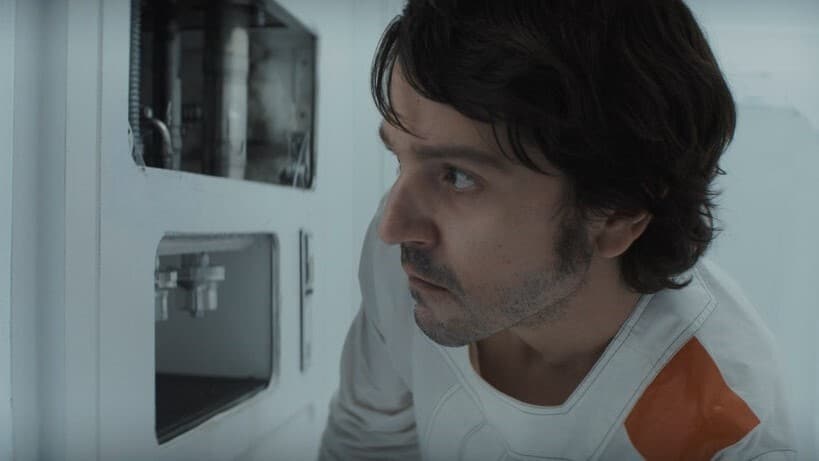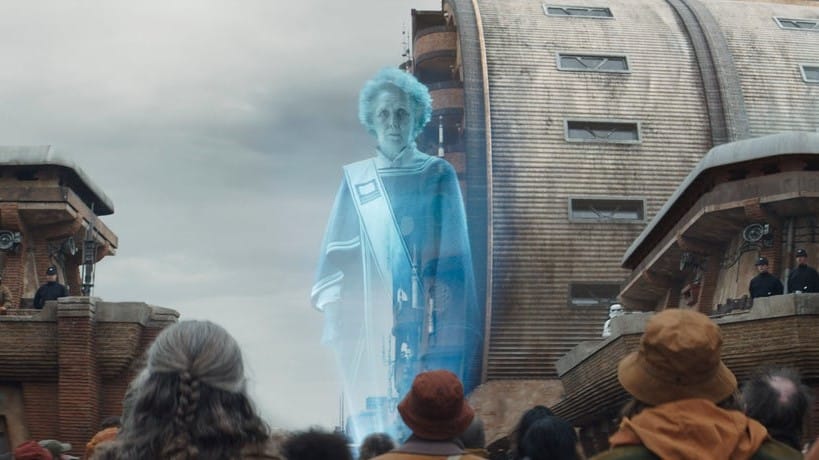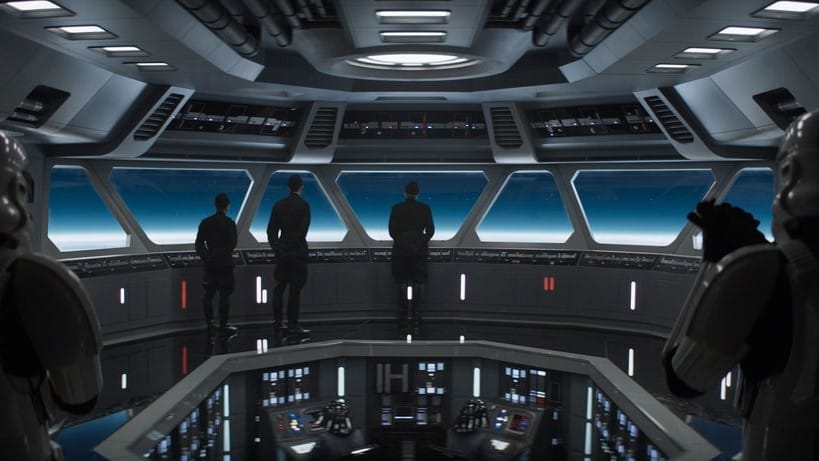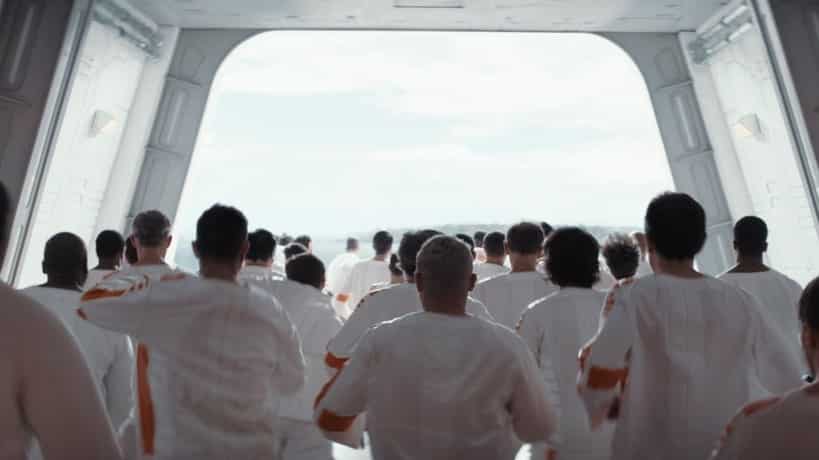Plans are afoot across the galaxy as Inspector Mero closes in on the rebel Axis, Mon Mothma has a family reunion, and Cassian plots a prison break in “Nobody’s Listening!” episode 9 of Andor season1!
Austin Gorton: Welcome back to Level 2, Adam! I know you thought your shifts were up, but the Empire ComicsXF still needs your service, so it’s back to the floor to assemble some more widgets reviews for you!
Adam Reck: Austin, I thought I only had 217 shifts left, but I’m getting word via two day old hand gestures that a lot of stuff happened in this episode of Andor and it would probably be a good idea to get On Program and talk about it!
The Empire Doesn’t Rest, Mon

Austin: The deeper into its run it gets, the more (depressingly) resonant the series gets, and there’s a striking example of that early in this episode, as we see Mon speaking out in the (increasingly deserted) Senate chamber about Imperial overreach, as various boos and beeps of annoyance descend down on her. She is speaking truth to power, and no one wants to hear it; is it any surprise that she turns around and holds a meeting with her financial co-conspirator to figure out how to get more Rebellion money?
Adam: I don’t recall this in the Prequels, but the visual of the Senate pods’ lights going out as a visible signal of dissent is fairly striking. Tay’s options for money laundering are inevitably going to involve a criminal element though, and it’s the first time we see the usually nervous Mon’s hackles really go up. But she has no choice but to deal with the devil if she wants to find a home for the stolen credits. Before Tay even shows up, we see another familiar face – Vel is here and she’s Mon’s sister?!
Austin: I think she’s her cousin (though Leida does call her “Aunt Vel” so who knows which is the cover story and which is a bit of familial nomenclature). There’s been a lot of online speculation as to who Vel might be related to (with her being Luthen’s daughter a front runner, which could still technically be true), but I was still legitimately surprised to see her. It fits — we learned last episode that Vel comes from a wealthy family, and it ties in with the series’ ongoing discussion of the best way to rebel. With this reveal, we see two different methods being deployed within the Mothma family: Mon, who is trying to work from inside the system, and Vel, who is casting off the system to directly lead Rebel raids on poor agrarian planets being trampled over by the Empire.
Adam: I loved that when Mon tried to small-talk Vel, she repeats the line Cinta said to her last episode, “The Empire Doesn’t Rest.” There’s a feeling of forward momentum here, where lasting damage needs to be executed as quickly as possible before they lose all control of their entire society. The stakes feel real in a way that the cackling Emperor never really does. These characters feel grounded in their fight, making their struggle all the more interesting.
Austin: She also echoes Sinta’s sentiment that the Rebellion comes first, and the rebels simply have to be content with whatever is left, a sentiment Vel pushed back against in the previous episode, which makes her expressing it here all the more interesting. Even these relatively minor characters are complex and layered.
Adam: Meanwhile Mon’s husband Perrin is still a real jackass at every opportunity. I keep waiting for him to betray Mon, but for now he just seems content in getting in his jabs, including a slight at Vel for not marrying a man yet, something we know she has no interest in.
Austin: I honestly hope he doesn’t betray her (or turn out to be an ISB plant or something like that), because the idea of him just being a (relatively) mundane jackass husband, a non-Imperial impediment to Mon’s efforts, is far more interesting. There’s a brief shot following Vel’s departure with Mon standing in her Space Foyer, alone, with the space growing increasingly large as the camera pulls back. It recalls the way Mon stood alone in her senate hoverpod earlier, literally and figuratively, and I love the way the series is using the camera and staging to highlight her isolation.
Later, she meets with Tay, and as you mentioned, learns that in order to keep scrutiny away from her efforts to fund the Rebellion, she’s going to have to meet with some kind of unsavory financial type. As with the ongoing question of the best method of rebelling, it’s another example of the conversation the series is having about where to draw the line in terms of the people you associate with to get the job done. Mon is struggling with the concept Nemik already came to terms with: that an unsavory individual that doesn’t share your convictions can be useful as a tool, and the struggle for freedom requires the use of those tools.
Dizonite Death Torture

Adam: Speaking of unsavory characters, the episode opens with Dedra arriving on Ferrix to do some good old fashioned interrogation and torture. We see that Paak gave it all up and is a complete mess after his time with the evil Doctor Gorst (what a name!). And after some prodding, Bix learns the nature of the torture – listening to the death cries of alien children who rebelled too much for the Empire’s liking. We do not hear the signature sound, and like any good horror element, it’s better to try imagining it. Bix knows she’s going to be hurt someway or another, so she doesn’t even bother to tell Dedra anything, telling her “You’re not going to believe me anyway.”
Austin: That exchange was chilling — Deedra basically admitting there’s nothing Bix can so or do to avoid being tortured. And the whole bit with the sound torture is just horrific. It’s a great example of how this series’ depiction of the Empire as a kind of quietly mundane evil is so effective. They’re using sound to torture people, and it’s the sound of other people being tortured. It’s both evil for what it is, and evil in its efficiency, like they’re not going to let the suffering inflicted on someone else go to waste.
At the same time, there’s something darkly comic about the fact that Deedra is getting closer and closer to Cassian, but Cassian is already in Imperial custody and nobody knows it. Which of course lends an added element of danger to the prison break setup (more on that below): arguably, Cassian is safer inside than out at the moment. As is, it’s highly likely he’ll bust out of prison only to find himself in a galaxy where he’s on the most wanted list.
Adam: It’s also amusing to see the ISB get such a thrill out of their awful actions. They’re clearly all gunning for each other (I mean just look at Dedra’s assistant butting in and taking initiative when she hasn’t asked him to), but if there’s an opportunity to kill a dude and leave him floating in space? It’s like they announced happy hour after the shift is over.
We get our second mention of the yet unseen Anton Kreegyr and whatever shenanigans he’s planning on Spellhaus, but it seems like the ISB folks are well ahead of him having accidentally captured a rebel pilot willing to spill the beans to Dr. Gorst. Wow Gorst really makes the rounds, huh. He’s just the Gorst. But was the capture really an accident? Does this all seem a little too convenient?
Austin: This may be wishful thinking on my part, but I’m hoping this is all part of some kind of Rebel ruse/attempt to use the Empire’s gleeful zealotry against them. Kreegyr is, as far as I know, an original creation of this series, so I have no idea where this is going, but he’s almost approaching a Chekhov’s Gun level of setup in terms of making an appearance at some point.
Speaking of appearances, we check back in with Karn this episode, as he pops up casually hanging out near the entrance to the ISB, holding a boombox, hoping to bump into Dedra, just like all totally chill dudes do.
Adam: Our buddy Karn is turning into real stalker material here, which does beg the question: Why is Dedra not immediately throwing him to the wolves? She threatens him, sure, but am I also sensing a little, romantic tension? These two have a lot in common, and I wouldn’t be surprised if Karn’s creepy pledge to the Empire also strikes Dedra as mildly inspiring. I remember when we started covering the season, I had pretty much written Karn out. Now every time he pops up, either bickering with his mother or hovering around ISB HQ, he’s kind of a delight? You know, for a very annoying, terrible, wannabe evil person…
Austin: I continue to love every scene he’s in, and he makes for a fascinating counterpoint to so many characters: as trapped as Cassian, as zealous as Luthen, as isolated as Mon Mothma. Dedra is really the closest thing he has to an ally, someone who approaches his level of faith in the power of justice and of the Empire to provide it, so it’s not surprising he’s drawn to her. There’s definitely some vibes there, though how much of that is due to feelings of affection on Dedra’s part and how much of it is her seeing in Karn, as Luthen does in Cassian, a useful tool to serve her larger purposes, is unclear.
How Many Guards Are on Each Level?

Austin: Meanwhile, back in Shawshank Widget Building Prison, we get a sense that time has passed thanks to Cassian having ingratiated himself into his work team, with at least some elements of the group now tracking the movements of guards and whatnot, with an eye on busting out. Like heist films, “prison break” is another subgenre I dig, and I honestly could have spent the entire episode inside with Cassian working out his plan, trying to get others on board, etc.
Adam: You joke about Shawshank, but it was really funny to have Cassian say “I’m taking my fifteen,” and walk off the floor to try sawing through a random pipe. Given the lack of context he must have about his surroundings, it feels pretty desperate. That said, Cassian consistently shows off two skills: His ability to absorb information and his ability to make allies who will help him in his endeavors. We see him keeping track of the guards, conspiring with other prisoners, and coming to conclusions like the fact that no one is listening in on their conversations in the cells. He’s not alone, in fact his fellow prisoners have developed a fascinating makeshift sign language to communicate from level to level to level. Something Serkis’s Kino Loy thinks is a waste of time. His eyes are on the number of days left in his sentence. However, the news of the day (or past days) is that something horrible happened on Level Two leading to all the prisoners being killed.
Austin: The whole “no one is listening” sentiment that gives the episode its name is another example of how chillingly mundane the series’ presentation of the Empire is — the prisoners are so non-essential, so replaceable, so beneath the notice of anyone in power that not even monitored for possible uprising or jailbreaks. If they rise up or break out, why does the Empire care? They can just kill that batch and refill their ranks with more people brought in via trumped up charges. The prisoners are only valuable as a source of labor, and even that value is miniscule.
Loy is the character who gives this plotline an arc in this episode, as we watch Cassian work to break down his steadfast belief in the system. Whether or not Loy believes the Empire is listening is irrelevant; he simply doesn’t want anything — even hope — shattering the defense he’s built around himself that if he puts his head down and works his shifts, he’ll be released once the number ticks down to zero. It’s only when something breaks through those defenses that he gives Cassian the information he’s after, with the implication being that Loy is onboard Team Escape Plan.
Adam: And what a reveal it is. After following the quickly failing health of Ulaf all episode, he finally collapses on his way back to the cells. Loy summons a nurse hoping Ulaf can be saved. After all, Ulaf “only has a few days left” in his sentence. Loy is convinced he can get this man back out into the galaxy far, far away. Unfortunately, it’s because of his conviction that we learn from the nurse the awful truth of what happened on Level Two. The prison put a released prisoner back into the same group he previously left, starting a riot that resulted in the death of all the prisoners on that level.
I have questions about this, starting with the obvious: Regardless of which level the prisoner was returned to, wouldn’t he tell his new fellow prisoners he was released and then reinterred? What would stop the prisoner from telling his story? Why did the prison think no one would notice? And if this has been common practice, which I feel is the insinuation, how did no one notice before? All of this is a moot point, because the truth lands with the thud of a widget on the workshop table. You can almost see Loy calculating his remaining days and becoming radicalized right before our eyes.
Austin: Not surprisingly, Serkis is really good in that moment at saying a lot while actually saying very little. I share much of your confusion about the mechanics of the uprising and subsequent purge on Level Two. I wasn’t sure if the implication was that no one ever gets out, just shunted onto another level, or if the idea was that everyone who gets out almost immediately gets recaught, re-tried, and re-sentenced because of the Empire’s stringent new laws. Ultimately, just like the question of what the widgets the prisoners are building are meant to be, it probably doesn’t matter. What matters is the impact it has on the characters, and the way it’s another example of the Empire’s practices and policies circling back and risking them harm by inspiring rebellion.
Adam: Well, what it does mean is that no more than 12 guards on each level and that means we are headed for a Prison Break episode next week, and I am psyched! I’m also anticipating the reveal of Kreegyr (maybe another big-name actor surprise?) and learning more about what’s happening on Spellhaus. I’m assuming it’s more than spelling.
Force Facts
- Ulaf actor Christopher Fairbanks may be familiar to comic book movie fans. He played the thug in the 1989 Batman who Keaton said “I am Batman” to, as well as the broker in Guardians of the Galaxy.
- In an interview with Collider, Andy Serkis said that working on the prison sets was daunting, “You really did feel like you were incarcerated in some strange weird place.”
- Set decorator Rebecca Alleyway told the Wall Street Journal that Karn’s office was based on a 1960s illustration of what a futuristic office space might look like.
- The shot at the twelve minute mark is a direct homage to the scene in A New Hope where Leia encounters the interrogation droid.
- Kyle Soller who plays Syril Karn said the cereal he’s eating in multiple scenes is a real culinary creation from the props department. Soller calls them “Star Wars Cocoa Puffs” that are “surprisingly delicious!”







